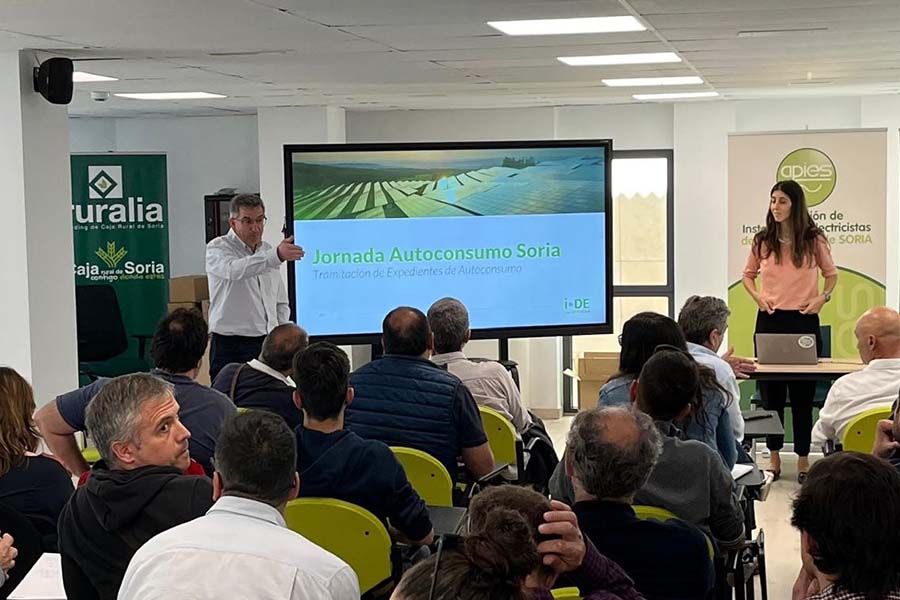i-DE brings self-consumption closer to installers in Soria
-
Iberdrola España's distribution company held an informative conference on self-consumption of electricity with the presence of the Territorial Industry Service of the Regional Government of Castilla y León.
-
The boom in self-consumption, which also contributes to the fight against climate change, has come about thanks to technological advances, lower prices for the elements that make up the installation, easier administrative procedures and local and state aid.

Half a hundred installers have gathered in the capital of Soria for a conference on electricity self-consumption that i-DE, Iberdrola España’s distribution company, has held for the Association of Installers of Soria (APIES) in order to address the most relevant technical and legislative aspects of the process of connecting individual and collective self-consumption installations to the grid.
During this informative session, which was attended by the Territorial Industry Service of the Regional Government of Castilla y León, i-DE highlighted the need to have the grid ready for the expansion that the market is experiencing with the penetration of self-consumption or renewable energies. This is possible thanks to an increasingly robust, flexible and smart grid, which we must continue to promote as it is the real backbone for decarbonisation.
Development of self-consumption in Castilla y León is beneficial for the competitiveness of companies, the economy of families, as well as for the very fabric of local installation companies.
José Manuel Calvo, Head of i-DE's Sector Soria, stressed that now is time for self-consumption and distributed generation and pointed out that "i-DE's distribution network in Castilla y León and, specifically, in Soria, has been able to respond to the strong increase in self-consumption without saturating or overloading the market thanks to the investments made in recent years".
They also discussed the importance of stable and predictable regulation to ensure investment in grids to transform the local distribution grid in cities and towns into a smart grid. "It is necessary to increase investment in grids to be able to integrate new renewable power, offer security of supply and resilience against extreme weather events and to be able to develop the digitalisation of the system, which is so necessary for the expansion of electric mobility, self-consumption and the electrification of heat in industry. For every euro invested in renewables, one euro should be invested in electricity grids", said Calvo.
Innovation and digitisation of electricity grids will continue to improve the quality of supply and service to citizens, making the energy they consume more efficient.
Photovoltaic self-consumption, an ally against climate change
Over the last few years, solar panels have become a common feature in urban and rural landscapes due to the rise of photovoltaic self-consumption. The boom in this type of self-consumption, which also contributes to the fight against climate change, has come about thanks to technological advances, lower prices for the elements that make up the installation, easier administrative procedures and local and state aid.
i-DE closed last year reaching the best year-end value in its history in terms of service quality
i-DE closed 2023 in Castilla y León reaching the best year-end value in its history in terms of service quality. Iberdrola España's distribution company manages more than 50,000 kilometres of power lines and has 15,754 transformer stations in service and 249 substations.
In recent years i-DE has undertaken an "ambitious" plan to digitalise its electricity grids, converting its more than 1.5 million meters in the region and the infrastructure that supports them into smart meters, incorporating remote management, supervision and automation capabilities.
The digitisation of the electricity distribution grid will provide more information to implement additional energy efficiency and sustainability measures, in a way that is committed to ambitious and urgent climate action. The deployment of smart grids makes it possible to respond to new models of grid use and offer a better service to citizens.
